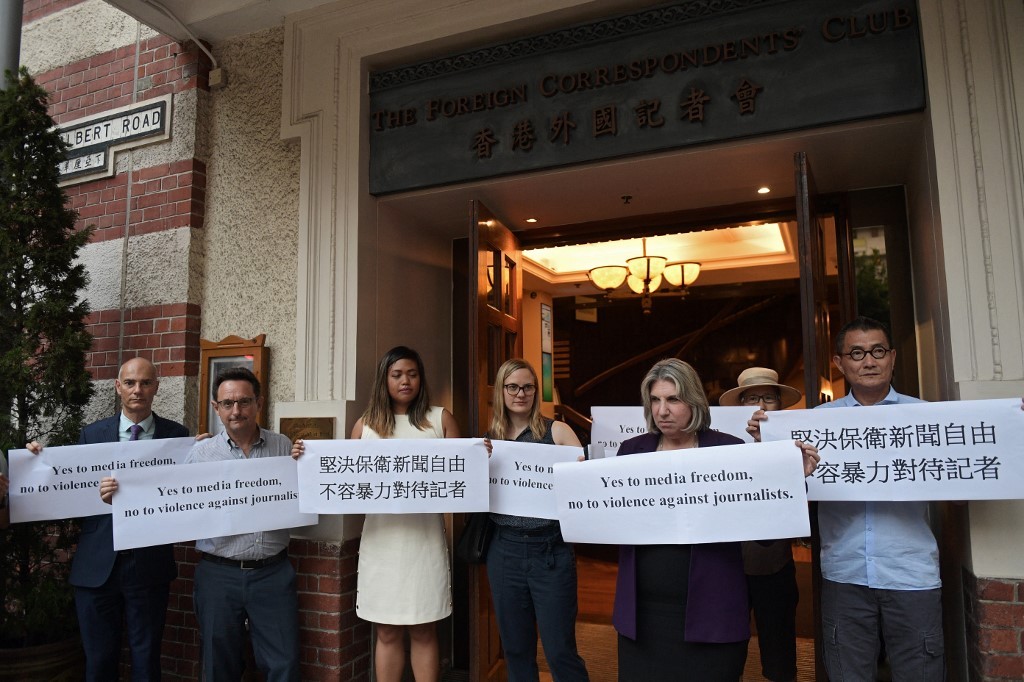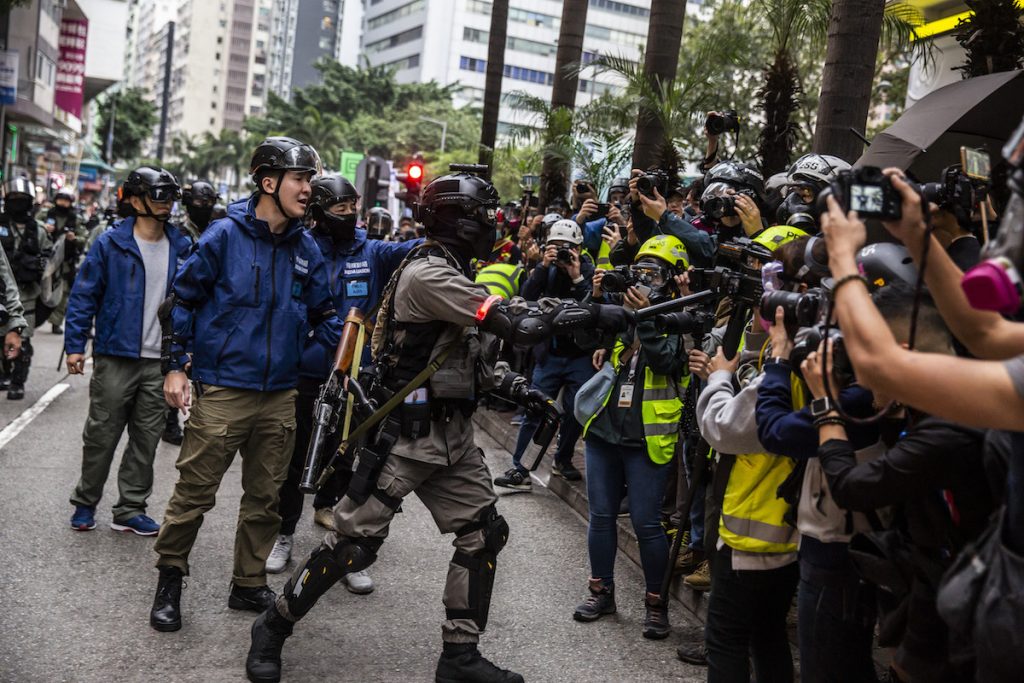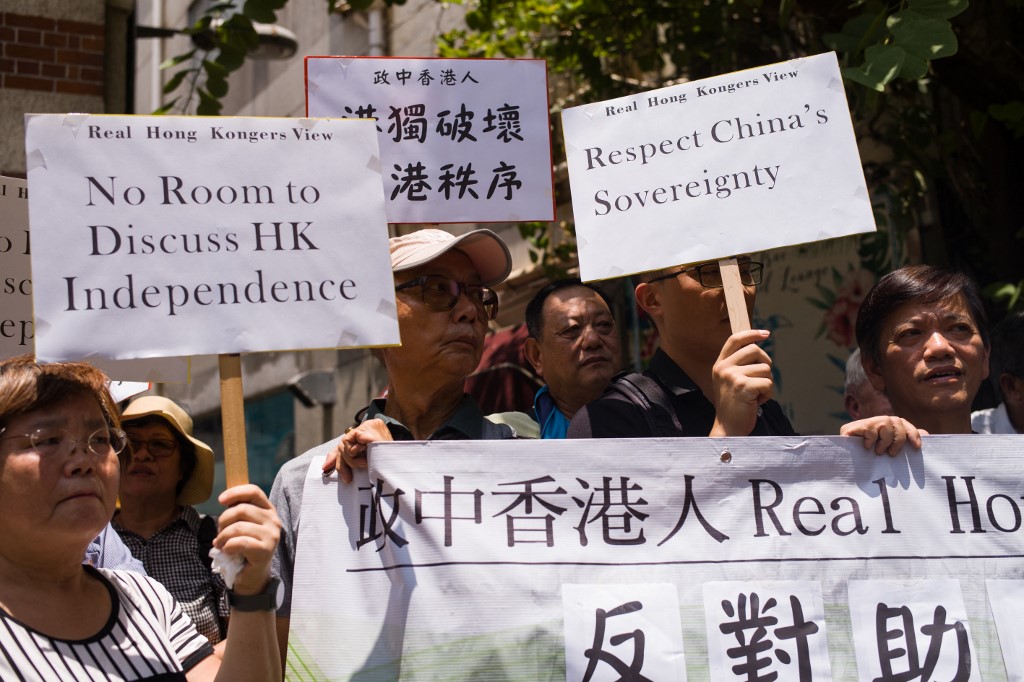
Foreign correspondents working in Hong Kong say sources are far less willing to talk to them since the ruling Chinese Communist Party (CCP) imposed a citywide crackdown on public dissent and protest under its national security law.
More than 80 percent of respondents to a survey by the Foreign Correspondents’ Club (FCC) said the working environment for journalists had deteriorated since the CCP imposed the law — which bans words and deeds considered “seditious,” “subversive” or supportive of independence — from July 1, 2020.
“The results revealed widespread uncertainty among members over what the media is and is not allowed to report on since the implementation of the National Security Law in June 2020, and concern over the further erosion of press freedom,” the FCC said in a statement on its website.
It said members are also worried about the government’s plans to pass a law banning “fake news.”
“In many ways it has become worse than the mainland because nobody knows what the red lines are and there is real fear that previous coverage could be scrutinized,” one respondent told the survey on condition of anonymity.
“Self-censorship and the drying up of sources is another result of the [national security law].”
Others said there are now concerns about journalists’ ability to protect their sources.
“Now, many people are reluctant or refuse to talk on sensitive subjects, and our organization — especially after the raids on Apple Daily — is much more cautious about data security and the ability to protect sources,” another respondent said.
In all, 86 percent of 99 respondents said sources were less willing to talk on sensitive topics, while 14 percent said there had been no change.
“Many of my sources are now in jail,” one respondent said. “Some have fled abroad. Others now refuse to comment to foreign media, [out of] fear that speaking to a foreign journalist could aid a prosecutor’s case against them under the National Security Law.”

Insisting on anonymity
Even Hongkongers in exile are insisting on anonymity if they talk to the media, out of a desire to prevent political retaliation against their loved ones back home.
Some organizations said they would be wary of writing about supporters of independence for Hong Kong, while more sensitive stories are now being handled by colleagues outside of the Hong Kong, to protect those still living there.
Nearly half those interviewed said they weren’t sure exactly what is and isn’t permissible to write, publish or say under the law.
“Many respondents agreed that the definition of what is considered sensitive is shifting all the time, thereby forcing them to exercise a greater degree of caution,” the FCC said.
“The definition of what is sensitive has broadened from the specifically political to encompass the work of civil society, the media, trade union and cultural organizations,” it said. “There is no indication that this widening process is about to stop.”
Several respondents expressed concern that the “fake news” law would be used by the authorities to suppress reporting that they don’t like.
And even work published some time ago could be used as evidence against them, some respondents said.
Meanwhile, 77 percent said they are now concerned about digital or physical surveillance, while 12 percent said they had already experienced it.
More than one third said they are thinking about leaving the city.
“The rapidly deteriorating political environment in Hong Kong has made me consider cutting short my stay in the city,” one respondent said. “While we’re not planning an imminent departure by any means, myself and several others I know are reconsidering previous plans to stay in Hong Kong over a longer time frame, given the city we arrived in was very different than the city we currently live in.”

China sees ‘black hands’
Beijing on Friday hit out at the survey, saying it was an attempt to “villify” the rule of law in Hong Kong, citing a rise of 18.5 percent of foreign media workers holding visas in the city in April, compared with April 2020.
The FCC had “wilfully attacked Hong Kong’s National Security Law and Hong Kong’s press freedom,” a spokesperson for the Office of the Ministry of Foreign Affairs in Hong Kong said in a statement on the office’s official website.
“[The spokesperson] expressed strong dissatisfaction and resolute opposition, and warned the FCC to stop … its despicable acts and noise-making,” it said.
It said the survey was the work of “black hands who … undermine the rule of law in Hong Kong in the name of so-called press freedom,” adding that foreign journalists should strictly abide by Hong Kong and Chinese law.
The survey came as NBA star Enes Kanter called on the international community to support a “free Hong Kong,” sporting a customized pair of shoes bearing images of the 2019 protests and pro-democracy movement, including Lion Rock, a gas-mask-wearing protester, yellow umbrellas and a blood-spattered bauhinia, the emblem of the city since the 1997 handover to China.
The shoes are also emblazoned with the words “Free Hong Kong” and “Revolution now.”
Wearing a “Stand with Hong Kong” T-shirt, Kanter had earlier posted a video to his Twitter account on Nov. 2 calling for solidarity with the protest movement.
“When someone says Hong Kong to me, the very first thing I think of is the people, the brave Hongkongers standing up against China’s dictatorship,” Kanter says.
“Hong Kong used to be one of the freest cities in the world but in recent years that has all changed. Enacted by Beijing, the National Security Law is sending generations of Hongkongers to jail simply for exercising their basic rights to freedom of assembly, freedom of speech and freedom of expression.”
He called on Friday for a boycott of the 2022 Beijing Winter Olympics.
“The people have done nothing wrong, nothing. All they wanted was to be heard, to be respected, to express their views freely. All they want is freedom,” he said.
Copyright © 1998-2020, RFA. Used with the permission of Radio Free Asia, 2025 M St. NW, Suite 300, Washington DC 20036. https://www.rfa.org.
Source: Licas Philippines
0 Comments